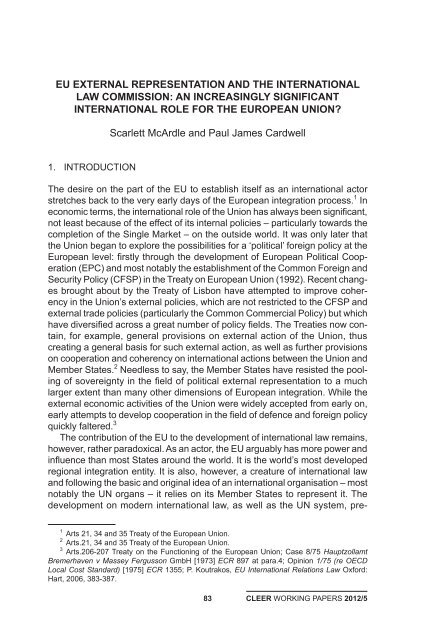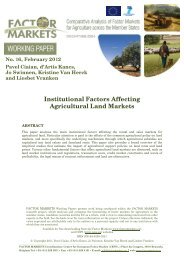Principles and practices of EU external representation - Asser Institute
Principles and practices of EU external representation - Asser Institute
Principles and practices of EU external representation - Asser Institute
You also want an ePaper? Increase the reach of your titles
YUMPU automatically turns print PDFs into web optimized ePapers that Google loves.
The International Law Commission: An increasingly significant role for the <strong>EU</strong>?<strong>EU</strong> External Representation <strong>and</strong> the InternationalLaw Commission: an increasingly significantinternational role for the European Union?Scarlett McArdle <strong>and</strong> Paul James Cardwell1. IntroductionThe desire on the part <strong>of</strong> the <strong>EU</strong> to establish itself as an international actorstretches back to the very early days <strong>of</strong> the European integration process. 1 Ineconomic terms, the international role <strong>of</strong> the Union has always been significant,not least because <strong>of</strong> the effect <strong>of</strong> its internal policies – particularly towards thecompletion <strong>of</strong> the Single Market – on the outside world. It was only later thatthe Union began to explore the possibilities for a ‘political’ foreign policy at theEuropean level: firstly through the development <strong>of</strong> European Political Cooperation(EPC) <strong>and</strong> most notably the establishment <strong>of</strong> the Common Foreign <strong>and</strong>Security Policy (CFSP) in the Treaty on European Union (1992). Recent changesbrought about by the Treaty <strong>of</strong> Lisbon have attempted to improve coherencyin the Union’s <strong>external</strong> policies, which are not restricted to the CFSP <strong>and</strong><strong>external</strong> trade policies (particularly the Common Commercial Policy) but whichhave diversified across a great number <strong>of</strong> policy fields. The Treaties now contain,for example, general provisions on <strong>external</strong> action <strong>of</strong> the Union, thuscreating a general basis for such <strong>external</strong> action, as well as further provisionson cooperation <strong>and</strong> coherency on international actions between the Union <strong>and</strong>Member States. 2 Needless to say, the Member States have resisted the pooling<strong>of</strong> sovereignty in the field <strong>of</strong> political <strong>external</strong> <strong>representation</strong> to a muchlarger extent than many other dimensions <strong>of</strong> European integration. While the<strong>external</strong> economic activities <strong>of</strong> the Union were widely accepted from early on,early attempts to develop cooperation in the field <strong>of</strong> defence <strong>and</strong> foreign policyquickly faltered. 3The contribution <strong>of</strong> the <strong>EU</strong> to the development <strong>of</strong> international law remains,however, rather paradoxical. As an actor, the <strong>EU</strong> arguably has more power <strong>and</strong>influence than most States around the world. It is the world’s most developedregional integration entity. It is also, however, a creature <strong>of</strong> international law<strong>and</strong> following the basic <strong>and</strong> original idea <strong>of</strong> an international organisation – mostnotably the UN organs – it relies on its Member States to represent it. Thedevelopment on modern international law, as well as the UN system, pre-1 Arts 21, 34 <strong>and</strong> 35 Treaty <strong>of</strong> the European Union.2 Arts.21, 34 <strong>and</strong> 35 Treaty <strong>of</strong> the European Union.3 Arts.206-207 Treaty on the Functioning <strong>of</strong> the European Union; Case 8/75 HauptzollamtBremerhaven v Massey Fergusson GmbH [1973] ECR 897 at para.4; Opinion 1/75 (re OECDLocal Cost St<strong>and</strong>ard) [1975] ECR 1355; P. Koutrakos, <strong>EU</strong> International Relations Law Oxford:Hart, 2006, 383-387.83CLEER WORKING PAPERS 2012/5








